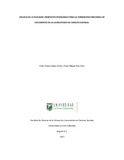Mostrar el registro sencillo del Documento
Escuela de la felicidad: propuesta pedagógica para la formación emocional de estudiantes de la Licenciatura en Ciencias Sociales.
| dc.contributor.advisor | Sabogal Moreno, Gonzalo Alberto | |
| dc.contributor.author | Ruiz Ortiz, Fredy Miguel | |
| dc.contributor.author | Reyes Pardo, Erika Viviana | |
| dc.date.accessioned | 2021-12-03T16:42:02Z | |
| dc.date.available | 2021-12-03T16:42:02Z | |
| dc.date.issued | 2021 | |
| dc.identifier.uri | http://hdl.handle.net/11396/7000 | |
| dc.description | Este documento tiene por objeto presentar la investigación Escuela de la felicidad, que pretende diseñar un modelo curricular para la enseñanza de Inteligencia Emocional (IE), en el plan de estudios de la Licenciatura en Ciencias Sociales, que contribuya a prevenir enfermedades mentales en el ejercicio de la profesión docente. En el primer capítulo, se realiza un desglose de las categorías usadas en la investigación: Salud mental e Inteligencia emocional. En este, se definen dichos conceptos de forma particular, para poder analizar algunas experiencias e investigaciones que han contribuido a la salud mental de docentes. En el segundo capítulo, mediante la aplicación de una rúbrica, diseñada en la indagación preliminar, se analiza la contribución de experiencias e investigaciones, a la salud mental de los docentes, realizadas desde los postulados de la IE; todo esto presentando mediante un informe. En el tercer capítulo se presentan los resultados y hallazgos importantes de las investigaciones, que son el insumo para el diseño curricular, presentado mediante un syllabus, en el cuarto capítulo. Al final, unas conclusiones y recomendaciones producto de la investigación. | spa |
| dc.description.abstract | The objective of this document is to present the research Escuela de la Felicidad, which aims to design a curricular model for the teaching of Emotional Intelligence (EI), in the syllabus of the Degree in Social Sciences, which contributes to the prevention of mental illnesses during the exercise of the teaching profession. In the first chapter, the categories used in the research are broken down: Mental Health and Emotional Intelligence. Here, these concepts are defined in a particular way, in order to analyze some experiences and research that have contributed to the mental health of teachers. In the second chapter, through the application of a rubric, designed in the preliminary research, the contribution of experiences and researches to the mental health of teachers, carried out based on the IE postulates, is analyzed; all this presented through a report. The third chapter presents the results and important findings of research, which serve as a subsidy for the curriculum design, presented through a study plan, in the fourth chapter. At the end, some conclusions and recommendations resulting from the research. | spa |
| dc.language.iso | spa | |
| dc.publisher | Universidad La Gran Colombia | spa |
| dc.rights | Attribution-NonCommercial-NoDerivatives 4.0 International | * |
| dc.rights.uri | http://creativecommons.org/licenses/by-nc-nd/4.0/ | * |
| dc.subject | inteligencia emocional | spa |
| dc.subject | salud mental | spa |
| dc.subject | salud ocupacional docente | spa |
| dc.subject | emociones | spa |
| dc.title | Escuela de la felicidad: propuesta pedagógica para la formación emocional de estudiantes de la Licenciatura en Ciencias Sociales. | spa |
| dc.subject.lemb | Educación - Currículo | spa |
| dc.subject.lemb | Modelos de enseñanza | spa |
| dc.publisher.department | Facultad de Ciencias de la Educación | spa |
| dc.publisher.program | Licenciatura en Ciencias Sociales | spa |
| dc.subject.keyword | emotional intelligence | spa |
| dc.subject.keyword | mental health | spa |
| dc.subject.keyword | emotions | spa |
| dc.subject.keyword | teacher's occupational health | spa |
| dc.publisher.branch | Bogotá | spa |
| dc.creator.degree | Licenciado(a) en Ciencias Sociales | spa |




